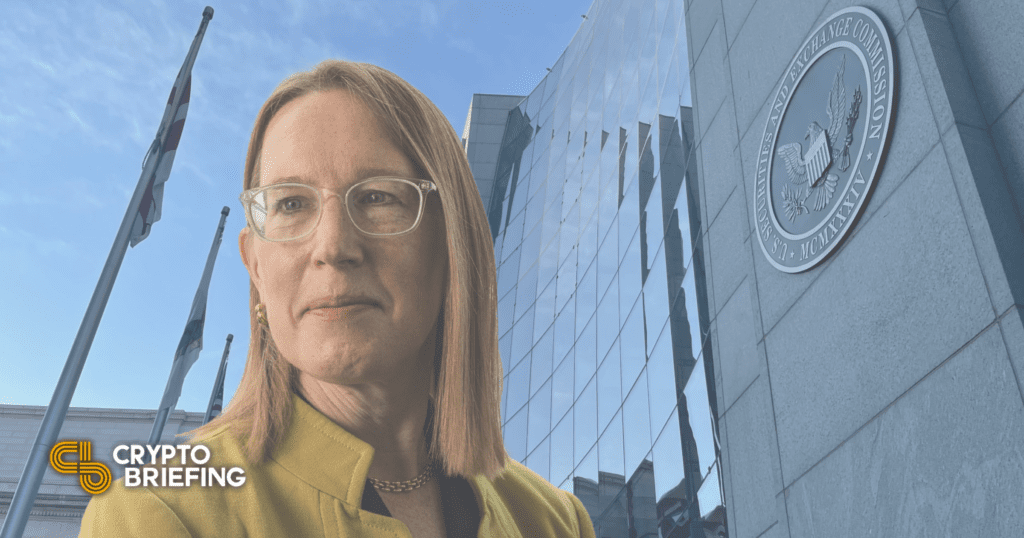
Photo: Greg Kahn. Shutterstock image by DCStockPhotography
Pro-Crypto SEC Commissioner Slams Agency’s Regulatory Approach
Commissioner Pierce warned that the securities regulator's agenda risks setting off "the regulatory version of a rip current."
Hester Pierce has issued a public statement criticizing the U.S. Securities and Exchange Commission’s new regulatory agenda. She described the agency’s approach as “flawed” and dangerous for the country’s capital markets.
Commissioner Pierce Blasts SEC’s Agenda
Commissioner Hester Pierce has spoken out against the SEC’s new crypto regulatory agenda.
The fervently pro-crypto member of the SEC’s five-person board of commissioners issued a public statement Wednesday bashing the regulatory agency’s new “Regulatory Flexibility Agenda.” Published the same day, the agenda includes 53 legislative documents that outline the short and long-term regulatory actions that the administrative agency plans to take.
According to the SEC’s Chairman Gary Gensler, the agenda is driven by two public policy goals: continuing to drive efficiency in U.S.’s capital markets and modernizing the rules for today’s economy and technologies. “Doing so will help us to achieve our three-part mission: protecting investors, maintaining fair, orderly, and efficient markets, and facilitating capital formation,” Gensler said in announcing the agenda in a press release.
Commissioner Pierce, however, disagrees with Chair Gensler’s approach to regulating capital markets, noting in her latest statement that his plan “sets forth flawed goals and a flawed method for achieving them.” She wrote:
“The agenda, if enacted, risks setting off the regulatory version of a rip current—fast-moving currents flowing away from shore that can be fatal to swimmers. Just as certain wave and wind conditions can create dangerous rip currents, the pace and character of the rulemakings on this agenda make for dangerous conditions in our capital markets.”
Commissioner Pierce then proceeded to blast the SEC’s plan, saying that it shunned issues at the core of the agency’s mission in favor of “shiny objects” outside its jurisdiction. “We once sought to protect retail investors; we now rush to the aid of professional investors,” she said, adding that she believes the SEC in its current form does less to help small and emerging companies and instead increases their costs and shrink their investor base.
Amongst her criticism, Commissioner Pierce also addressed the agency’s sneaky attempt to regulate crypto protocols—specifically decentralized cryptocurrency exchanges and liquidity providers—without first dealing with the industry’s primary needs and repeated demands for regulatory clarity.
“Although the Agenda includes rules that might regulate crypto protocols or platforms through an unmarked backdoor, it does not appear to include any rules primarily intended to grapple with the main regulatory questions that have arisen around these assets,” she wrote, referring to the SEC’s proposed rule to amend the definition of “exchange” in the Securities Exchange Act of 1934.
The said rule, outlined in a 591-page document published in January, fails to make any direct references to crypto assets or decentralized finance protocols. Instead, it proposed including all “communication protocols” and systems that facilitate buyers and sellers of securities within the Exchange Act’s definition of an “exchange.”
Many industry experts have argued that the proposed rule represents an effort on the SEC’s part to bring decentralized exchanges and money market protocols under its regulatory purview. More importantly, the definition’s excessively broad phrasing risks redefining all “communications protocols” as potential securities exchanges. As a result, many notable crypto industry stakeholders, including Coinbase, Delphi Digital, Coin Center, FTX, and the Blockchain Association, have submitted comments to the agency opposing the proposal.
Commissioner Pierce, responsible for SEC’s Token Safe Harbor proposal, stated that when the agency hurriedly writes and implements a myriad of rules it creates conditions that could roil the markets. “We can avoid creating regulatory rip currents by recalibrating our agenda to focus on issues core to the protection of investors and operation of our markets and by slowing down the pace to ensure that we and the public can think about what we are doing,” she summarized.
Disclosure: At the time of writing, the author of this piece owned ETH and several other cryptocurrencies.
